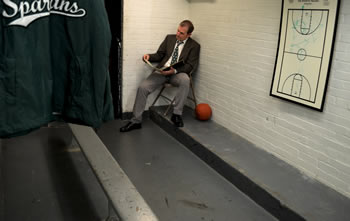HotReview.org Editor's
Picks
Shows Worth Seeing:

Our Last Game
By Ed Schmidt
Nord Anglia International School
44 E. 2nd St.
TICKETS
Ed Schmidt’s signature theme is failure. A tall, handsome WASP, he uses that pedigree to explore the territory of the hapless, the lost, the exhausted white male. In his 2002 play The Last Supper, Schmidt performed a stumbling monologue for an audience of 12 seated on 2 church pews crammed into his tiny Brooklyn kitchen. His performed ineptitude at cooking a meal was followed by a “surprise” communion when a thick red curtain was pulled back and a finished gourmet meal appeared on a richly laid table, to be enjoyed by everyone present. In My Last Play (2010) he also performed for an audience of 12, seated on folding chairs in a different Brooklyn apartment. This was another monologue, about the failure of Schmidt’s long investment in drama to succor or support him at critical life moments such as his divorce and his father’s death. He was essentially done with making theater, he said, and enacted a self-catharsis by asking the audience to help themselves to his large theater library (every spectator took one book from his shelves).
Schmidt’s latest work, Our Last Game—a monologue performed for audiences of, yes, 12, this time in a gym and tiny changing room at an East Village elementary school—differs from its predecessors in that its character is fictional: a basketball coach who goads, harangues and bullies the audience as if we were his teenage players. Interrupted by 2 intermissions, the show moves backward in time, beginning with a tearful pre-game speech announcing the coach’s retirement after decades of frustration, jealousy and disappointment, then proceeding to two locker-room speeches, years apart, that fill in pathetic and telling details of his back-story that his later memories omitted, obscured, or distorted.
The advantage of Schmidt’s new fictional focus is that it obliges him to act—that is, impersonate a character different from himself, despite superficial similarities (he actually is a high-school basketball coach)—and he does this with impressive punch, authority, and intensity. Although the coach’s story of self-delusion and disappointment never quite blossoms as a full-fledged work of fiction, it does show that Schmidt’s meditations on failure have grown broader and more complex over the years. His ruminations on loss of white male power are his swan-songs for a certain kind of once automatically enfranchised dude, and that generic self-critique has always hung over his biographical content. The jagged incompleteness of his plays is also consistent with their subject matter of breakdown and looseness, and the extreme intimacy of his performances always generates an immediacy that keeps spectators hyper-alert and actively involved. For my part, I’m grateful that Schmidt has pressed on with his strangely compelling microdramas, even if I sometimes leave them longing for a tad more form and wholeness in the deliberations on fracture and disintegration.
